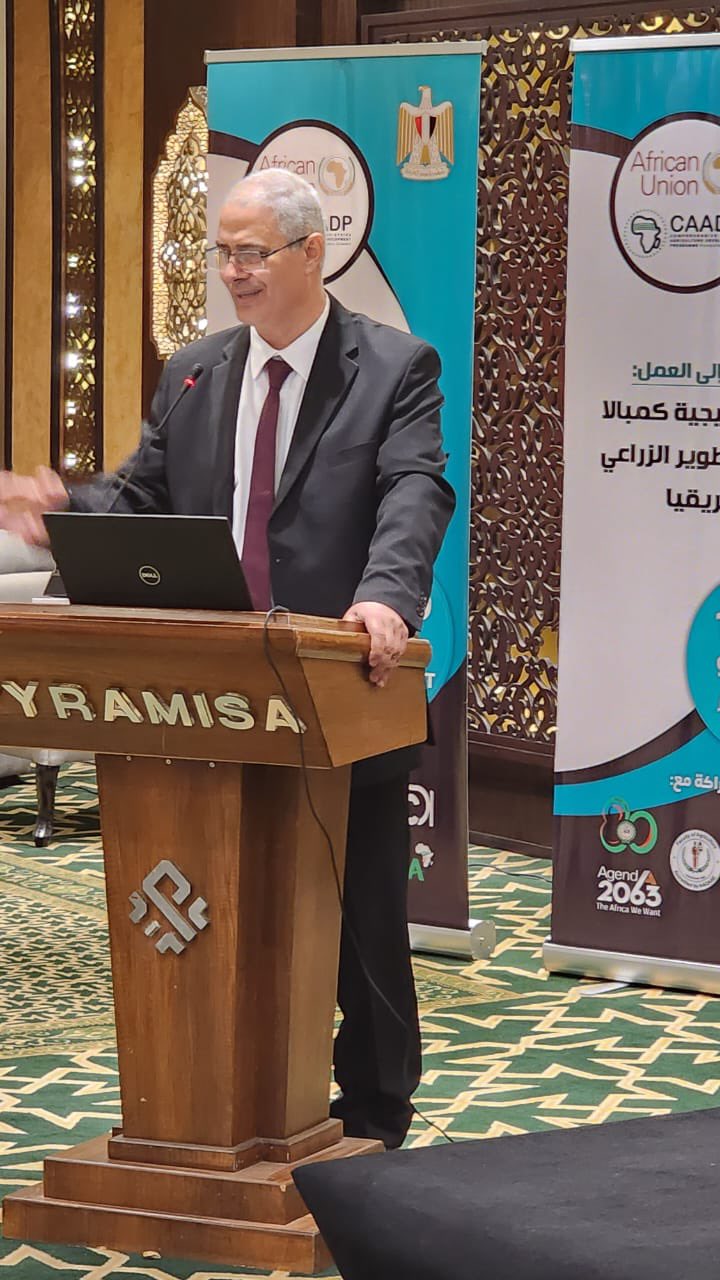This meeting was organized by AU‑SAFGRAD (the African Union’s Semi‑Arid Food Grains Research & Development office). It served as a key strategy session aimed at operationalizing the newly launched CAADP Kampala Strategy (covering 2026–2035), which is Africa's post‑Malabo framework for transforming agriculture through science and innovation.
It is important to strengthen joint African action to address the risks and challenges facing the region, as well as the optimal and effective exploitation of the vast and diverse economic and natural resources possessed by the African continent, to achieve intra-African economic integration and address the new global reality. Egypt develops agriculture through several axes, including: horizontal expansion through the reclamation of approximately 4 million acres to support the production of strategic crops and reduce the food gap therein, as well as vertical expansion through the development of new varieties with high productivity, early maturity, low water requirements, and tolerance to climate change.
Egyptian state's efforts include adopting modern technologies to develop irrigation systems and increase the efficiency of water resource use by building giant agricultural wastewater treatment plants. This is in addition to supporting the transition to healthy and safe food systems, reducing loss and waste by expanding the scope of the National Silos Program and diversifying import sources for strategic grain commodities. This is in addition to strengthening and expanding the social protection network through the "Takaful and Karama" programs and launching the presidential "Decent Life" initiative, which aims to alleviate the burden on citizens in the most needy communities in rural areas and urban slums, representing more than 60% of the Egyptian population.
The Ministry of Agriculture and its scientists from the Agricultural Research Center and the Desert Research Center are fully prepared to provide the necessary expertise and all means of support to cooperate with our brothers from the African continent, harnessing all capabilities to ensure the success of this cooperation and achieve food security. Alaa Farouk, Minister of Agriculture and Land Reclamation of EgyptThe workshop was attended by: the Director of the African Union Office for Research and Development at the African Union Commission; the Executive Secretary of the Forum for Agricultural Research in Africa; the Executive Secretary of the Arab Fund for Technical Support to African Countries; Dr. Adel Abdel Azim, Head of the Agricultural Research Center; Dr. Saad Moussa, Supervisor of External Agricultural Relations; and representatives of African Union bodies and organizations.
Objectives of the Meeting
- Translate the Kampala Strategy into a concrete Action Plan: Participants focused on identifying R&D priorities, setting targets, defining implementation pathways, and establishing an M&E (monitoring & evaluation) framework .
- Engage key stakeholders: A broad range of actors from national agricultural research centers, CGIAR institutes, regional bodies like FARA, and AU entities (e.g., SAFGRAD, AUC) were consulted to ensure ownership at all levels.
- Mobilize support and funding mechanisms: The meeting also explored ways to build strong public–private partnerships, secure donor engagement, and tap into new financing instruments to support agricultural research in Africa.
Key Themes Covered
- Strengthening R&D infrastructure up to 2035.
- Enhancing tech transfer—including mechanization, digital agriculture, AI, climate-smart practices.
- Establishing robust institutional frameworks and governance for implementation and monitoring.
- Formulating resource mobilization strategies.
This event marked the first major consultative workshop aimed at driving the shift from high‑level commitment—to the Kampala Strategy—toward tangible, on‑the‑ground action across Africa. The ultimate goal: to build sustainable, resilient, and innovation-led agri-food systems across the continent.
Extracts of the programma
Panel 2: Building Resilient Agricultural Research Systems
Panel 3: Leveraging Technology and Innovation for Agri-Transformation
- Moderator: Dr. Charles Kleinermann (CGIAR/ ICARDA)
- Dr. Baboucarr Manneh (AfricaRice)
- Dr. Oladunjoye Michael Adeyinka (Pan African University)
- Kofi Kisiedu Acquaye (YPARD)
- Dr. Niéyidouba Lamien (CORAF)
- Dr. Hernán D. Muñoz, Food and Agriculture Organization (FAO)
- Representative ARC Egypt
Panel 4: Bridging the Research-to-Practice Gap
- Moderator: Dr. Lilian Lihasi Kidula (AFAAS)
- Dr. Oyewole Babafemi (PAFO)
- Representative ROPPA/PROPAC
- Prof. Quirico Migheli, Director, Desertification Research Centre (EWA
- BELT)
- Dr. Uffelen, Gerrit-Jan van (WUR)
- Representative ARC/Cairo University
Panel 5: Gender, Youth and Inclusive Research Systems
- Moderator: Fatma Bensadok (Algeria – Gender/Training)
- Lovin Kobusingye (Uganda National Women Fish Organization)
- Kofi Kisiedu Acquaye (YPARD)
- Jenniffer Wairimu Waruingi (Kenya Youth)
- Dr. Jennie Van der Mheen (WUR) University
- Dr. Laura Altea (EWA BELT )
- Representative ARC Egypt
Panel 6: Institutional Collaboration and Policy Engagement for Kampala Delivery
- Moderator: Dr. AKwesi Ntiamoah Atta-Krah, Senior advisor to the Regional Director for Africa
- Dr. Uffelen, Gerrit-Jan van (WUR)
- Dr. Aliou Faye (ISRA, Senegal)
- Representative ARC/Cairo University
- Dr. Moyo Siboniso, ILRI Deputy Director General
Panel 7: Resource Mobilization and Public-Private Partnerships
- Moderator: Dr Kwaku Antwi (FARA)
- Dr. Oyewole Babafemi (PAFO – Farmer/PPP links)
- Dr. Tapsoba François (EWA Scientific Board)
- Peter Claver Anyeembey (Ministry of Agriculture, Ghana)
- Dr. Mohammed Ssemwanga (AGRENES-Private Sector)
- Representative Cairo University
- Representatives from AFTAAC
- Representative ARC Egypt
Key Outcomes & Next Steps
- Drafting of an AU-SAFGRAD Action Plan. Outlining thematic priorities, institutional roles, performance indicators, and implementation timelines.
- Governance Frameworks Initiated. Draft TORs for coordinating bodies, partnership agreements, and M&E systems were proposed for adoption at continental and regional levels
- Resource Mobilization Framework Drafted. Including proposals for public–private funding, donor coordination, and engagement with “Team Africa” financing mechanisms
- Research Priorities Finalized. Soil health, digital/agri-tech, AI, mechanization, climate-smart practices and value-chain R&D were signed off as flagship areas
- Partnership Agreements Under Development. Including a roadmap for AARIEIs (Africa‑wide Agricultural Research & Innovation Excellence Institutions) aligned with Kampala goals
- RUFORUM-Led Capacity Support Planned. RUFORUM to roll out training programs aiding national implementation efforts






No comments:
Post a Comment